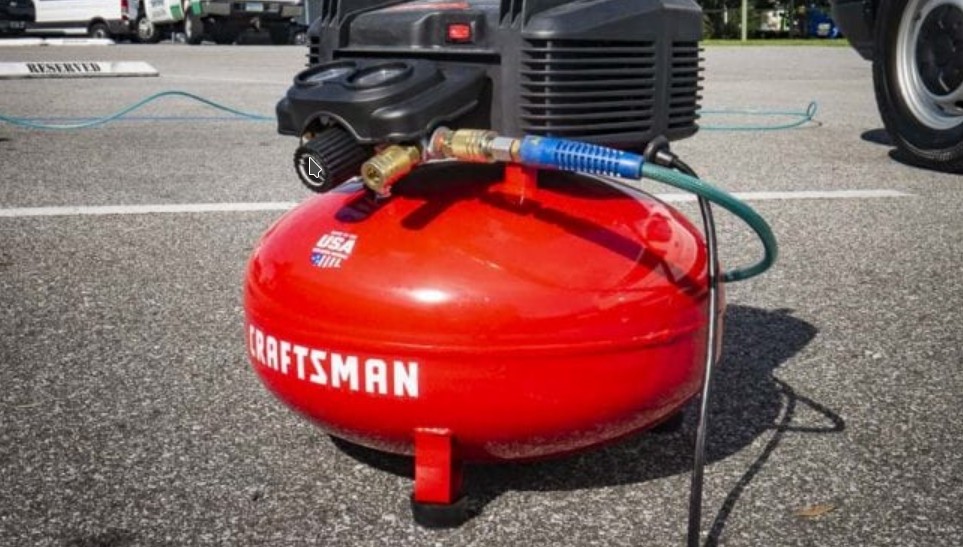What is the Life Expectancy of an Air Compressor?
Every time I get a new machine, I am curious about its life expectancy. I like getting value for my money and knowing how long a device will serve efficiently. Air compressors have life expectancy commonly known as service life.
Typically, regularly serviced air compressors will last for about 40,000 to 60,000 hours. We calculate the service life of air compressors in hours. It is a more accurate measure than years because hours make it easier to measure the frequency of use. That is, if you use your air compressor for one hour a day, you will get more years compared to someone who uses theirs for five hours a day.
Like any machinery, frequency of use, and maintenance determine an air compressor’s lifespan. Additionally, the care varies depending on the type. The most common types are; reciprocating, rotary screw, and centrifugal air compressors. Below we’ll cover in more detail the different lifespans of each of the three types.
How many hours does a reciprocating air compressor last?
A reciprocating air compressor has a minimum life expectancy of around 50,000 hours – which is about six years running 24 hours a day. Translating this to the average home garage use gives you over 15 years of use. Additionally, it takes about 10,000 hours before a rebuild is required.
Things to Do to Improve the Lifespan of a Reciprocating Compressor
We recommend performing periodic preventive maintenance for any air compressor. It will assist detect any issues before it gets worse. Here are the measures to take to improve your compressor’s service life:
- Valve maintenance. Valves should perform with minimum resistance; otherwise, valve failure can cause systems to lag too soon and wear out internal components.
- Replace or clean the inlet filter. If there are signs of damage or wear on the inlet filter, replace it; otherwise, a reciprocating compressor can work efficiently by cleaning the inlet filter frequently.
- Refill the gear oil regularly every 90 days. This oil is for lubricating moving parts of the reciprocating compressor.
Things to avoid that will reduce the lifespan.
Like all the other air compressors, you must perform preventive maintenance regularly to extend the expected lifespan.
- Store your reciprocating compressor away from dust and dirt as they can damage the valves, leading to performance issues.
- Do not overwork your piston compressor, as this may lead to high-cycle fatigue. The stress can damage the valve.
- Avoid using cheap oils for lubrication. Stale or acidic lubricants will corrode the metallic parts of the valve.
- Reciprocating compressors come with different models designed for various tasks. Do not use a compressor beyond the functions of its design as it can wear down the valve.
- Regularly check the compressor for the following signs of valve failure;
- Your compressor is quieter than usual (unless you deliberately made it quiet).
- An overheated compressor tank.
- An abnormal spike or reduction in line temperatures.
- Low compressor discharge.
- Production of sounds after the compressor is off. Valve failure can cause stalling.
- Suction pressures that are higher than average.
- Over-consumption of power or electricity.
How many hours does a rotary screw air compressor last?
Rotary screw compressors are known for their longevity. They can last between 60,000 – 100,000 hours but can last longer with periodic maintenance.
They are also prone to structural wear and component degradation, which affects the bearings and rotors.
Things to Do to Improve the Lifespan of a Rotary Screw Compressor
The rotary air compressor can run for thousands of hours, but it requires regular maintenance, which is considered expensive.The rotary screw compressor’s air-ends are the most critical components, as this is where the air is pressurized. Below are preventive maintenance procedures you can do to cut down on costs over time and improve the lifespan:
- Monitor the compressor’s temperature regularly to ensure the internal components are not overheating.
- Maintain air filtering and draining of the air compressor to prevent Rust from forming on the air-ends, which leads to corrosion of the metal parts. Clean and replace the filters periodically.
- Lubricate all moving parts and change the oil often to prevent corrosion, over-pressure, and over-heating of the air compressor.
- Sample the oil every 2-3 months and dispense the old oil and refill.
- Always use the proper settings of your compressor’s model. It is crucial to match system controls with storage capacity.
- Drain it frequently to keep moisture and water from pooling in the tank
- Fix leaks and prioritize the more significant leaks. Detect, mark, and repair all the leaks on the air compressor as they cause power wastage and system drops in system pressures.
- Ensure the drive train is aligned at all times to prevent stress on the motor bear.
Things to avoid that will reduce the lifespan.
Below are things to avoid that will reduce the lifespan of your rotary screw compressor.
- Do not stay for more than 3,000 hours without regular maintenance of your compressor.
- Do not mix old oils with the refill oil because you will be reintroducing contaminants back to your air compressor.
- Never change the grade of oil suggested by your manufacturer, as this can deteriorate the air compressor over time.
How many hours does a centrifugal air compressor last?
A well-serviced centrifugal air compressor has a minimum service life of about 150,000 hours, slightly under 20 years. It will also take about three years of continuous operation before it needs any replacement. Centrifugal compressors are known to be generally low maintenance.
ProTip: Ensure that you size your air compressor perfectly. An undersized air compressor will cycle more often hence putting more strain on the engine.
Unlike the reciprocating and rotary screw compressor, a centrifugal air compressor uses dynamic displacement to compress air and is oil-free by design. This advantage makes the centrifugal compressor well-suited for heavy applications.
Things to Do to Improve the Lifespan of a Centrifugal Compressor
Although a centrifugal compressor has fewer parts than other compressors, some components need regular maintenance and are prone to wear; the rotors, cooler, bearing pads, and internal labyrinth seals. The care also depends on the size and speed of the compressor.
- Due to their high operating speed, they are susceptible to unbalance and vibration, shortening their lifespan. Here are a few things to do to lengthen its lifespan:
- Check for the lubricant levels, rotor vibration, bearing temperature, inlet filter pressure, and unusual noises.
- Clean the oil filters and replace the cartridges periodically.
- Drain the oil from all systems, change it as advised by the manufacturer’s manual, and use the recommended oil for your model.
- Centrifugal compressors use a couple of bearing types such as; tilting pad, ball bearings, anti-friction roller. Always use bearing wear, adjustment, and replacement considerations specified by the manufacturer.
- Apply an anti-fouling coat for the stationary parts of the compressor. The labyrinth seals rub against the rotor resulting in jamming of the rotor and obstruction of flow passages on the stationary diaphragms.
- Replace internal seals regularly as they wear quickly from high vibration from process upsets or surges. Similar to fouling, worn internal seals degrade the performance of the compressor.
- Clean the internal components and surfaces using synthetic sponges only to avoid damaging these parts.
- Check for the belt tension. A too loose belt will increase energy consumption, while an overly tight belt will cause stress and overwork the motor bearings.
Things to avoid that will reduce the lifespan.
Below are things to avoid when it comes to centrifugal compressors:
- Don’t skimp on repairs or replacements of worn-out components. Operating on damaged parts overworks the compressor, which will shorten its service life in the long run.
- Do not run a compressor in the critical speed range in an attempt to get more CFM or pressure output. It will cause surging or pumping and damage the compressor—critical speed range is when there is an insufficient volume at the compressor inlet to allow stable operation.
- Never use low flash point solvents such as gasoline or kerosene in your air compressor, as this may cause an explosion permanently damaging your compressor.
NOTE: The first step of preventive maintenance is to keep a daily operating log to detect equipment malfunctions.
By servicing your air compressors correctly and regularly, you can eliminate or significantly reduce the need to replace parts of your compressor too often, which can be quite expensive. And always refer to the manufacturer’s manual for repairs and replacements for a long-serving air compressor.


